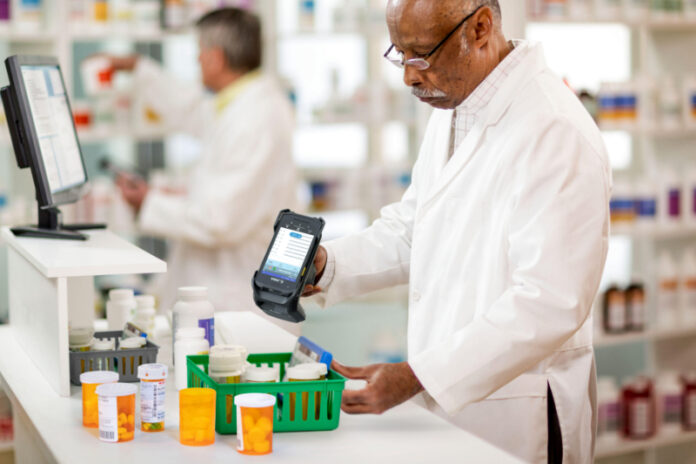The day of the pen-and-paper inventory system is pretty much over. In today’s era where customer demands are ever-changing and digital transformation is a need, the traditional approach has been a bottleneck for many businesses. The pandemic has clearly fast-tracked the shift to agile, efficient solutions.
Alpro Pharmacy, Malaysia’s largest prescription pharmacy chain, responded to these challenges by reassessing their traditional inventory management systems. They opted for Zebra Technologies’ mobile computing and RFID solutions to update their operations.
In this exclusive interview, Frontier Enterprise speaks with Lee Yin Chen, Branding Promotion and Trade Marketing Director & E-Commerce Lead at Alpro Pharmacy. Lee provides insights into the company’s digital transformation, detailing the challenges faced, solutions implemented, and the measurable outcomes that have resulted.
What were the primary pain points that led Alpro Pharmacy to adopt Zebra Technologies’ mobile computing and RFID solutions? How did these challenges influence your decision to choose Zebra’s products over other options available in the market?
Alpro Pharmacy’s decision to adopt Zebra Technologies’ mobile computing and RFID solutions was largely driven by changing circumstances and growing customer demands. Before the pandemic, our e-commerce operations adopted a conventional approach, listing products on e-commerce sites and marketplaces while fulfilling orders as they came in. At that time, our websites mainly served branding purposes, as online shopping was not yet a deeply ingrained habit among Malaysians.
However, the onset of the pandemic in 2020 led to a significant shift in customer behaviour. We saw a staggering 400% increase in e-commerce activity and a doubling of the number of patients visiting our physical pharmacies. This sudden surge in demand for fast, convenient, and accurate services led us to re-evaluate our operations. It became clear that our traditional, pen-and-paper-based fulfilment processes were no longer adequate to meet our customers’ heightened expectations.
One of the most urgent challenges was stock availability. Customers who made online purchases began experiencing slight delays of one to two days, only to find out later that the items they had ordered were out of stock. This issue exposed the limitations of our traditional fulfilment methods and highlighted the need for digital transformation to improve service across both online and offline channels.
As part of Alpro Pharmacy’s digital transformation journey, we’ve adopted various technologies to enhance our operations. These include establishing a website, designing user journeys, developing mobile apps, implementing enterprise resource planning (ERP) systems, and digitising warehouse operations.
In choosing handheld units for our systems, Alpro Pharmacy conducted a thorough evaluation of different companies and brands. We ultimately selected Zebra Technologies for several reasons: the stability, connectivity, and compatibility with our ERP and RFID systems. Additionally, the quality of after-sales service from the Zebra team was a key factor in the success of our digital transformation project. Building a strong relationship between users and vendors is crucial when embarking on a digital transformation journey.
Can you elaborate on the role of Inchz IoT in the decision-making process and how they contributed to the successful proof of concept?
We collaborated closely with Inchz IoT Sdn Bhd, a Zebra PartnerConnect reseller, to implement and deploy the solution. Inchz IoT worked in tandem with Zebra to fully understand the business challenges we were facing before recommending a customised solution tailored to our needs.
After a thorough assessment of the technology’s functionality and cost-efficiency, as well as witnessing a seamlessly executed proof of concept, Alpro Pharmacy decided to implement Zebra TC21 mobile computers and RFD40 UHF RFID sleds in both our distribution centre and stores.
What were some of the limitations that Alpro Pharmacy encountered with the previous pen-and-paper inventory management system? How did these limitations influence the decision to switch to Zebra’s TC21 mobile computers and RFD40 sleds?

Alpro Pharmacy operates under two business models: a B2C model, where we engage directly with end users, and a B2B model, focusing on pick-and-pack operations in the warehouse. In the past, we relied on manual handpicking systems for both models. Employees would consult an order list, locate the items on the shelves physically, and then mark them off manually using pen and paper. This method was not only inefficient but also error-prone, as employees often picked the wrong items, incorrect quantities, or overlooked items altogether.
To address these limitations and enhance operational efficiency, Alpro Pharmacy adopted Zebra Technologies’ TC21 mobile computers and RFID solutions to revamp the traditional pick-and-pack process. With the TC21 units, new orders are sent directly to the handheld devices, enabling employees to easily scan and locate items, thereby significantly reducing errors.
We also integrated the RFD40 RFID units and incorporated RFID tags into our logistics process. After implementation, employees can now simply scan these tags to ensure the correct boxes are dispatched to their designated outlets. The synergy between the TC21 handheld units and the RFID solution has transformed our operations and improved overall efficiency.
Could you provide specific examples of how Zebra’s solutions have enabled Alpro Pharmacy to improve inventory management and order fulfilment? How has the efficiency of your order fulfillments increased, and what are the measurable outcomes in terms of capacity and e-commerce growth?
Zebra’s solutions have improved our real-time inventory visibility and the accuracy of our order picking. These mobile devices assist with a range of inventory management tasks, from receiving goods at Alpro Pharmacy’s distribution centre to picking goods for our retail stores and fulfilling e-commerce orders, to name just a few examples.
Since implementing Zebra’s solutions, Alpro Pharmacy’s operational efficiency has improved by approximately 80%, achieving nearly 100% accuracy in our warehouse fulfilment processes. This has had a substantial impact on the overall efficiency of our warehouse operations.
In terms of e-commerce, the number of orders has increased to an average of 15,000 across multiple online platforms. Thanks to the adoption of mobile computing technology, we’ve managed to handle this surge in orders without the need for additional staff. We estimate that our capacity has increased five-fold as a direct result of our digital transformation efforts with Zebra Technologies.
What were the key technical challenges that Alpro Pharmacy encountered during the initial phases of implementing Zebra’s mobile computing and RFID technology? How were these challenges addressed?
The key challenges that needed to be addressed for a successful implementation included understanding how to use the technology correctly and ensuring human involvement. During the initial stages of introducing the new technology into the warehouse, employees showed a preference for traditional processes, requiring a mindset shift towards automation.
Management’s perspective and active involvement were crucial in determining the success of the implementation. At Alpro Pharmacy, management led the digital transformation journey, fully understanding its significance and inspiring all team members. The entire digital transformation plan was communicated to everyone involved, ensuring a clear understanding of the reasons behind the new technology’s implementation. Management also recognised and addressed individual challenges employees might encounter, providing guidance to improve warehouse processes. Effective communication was crucial in facilitating the smooth integration of the new technology.
Can you elaborate on the integration of RFID technology with the TC21 mobile devices? How has this specific solution improved tracking accuracy and ensured proper inventory delivery to various locations?
The TC21 comes in a compact, rugged form factor with a 5-inch touchscreen, making them easy to use for staff. Their cost-efficiency allows for widespread use across Alpro Pharmacy’s operations. These devices handle all inventory management tasks, from receiving goods at the distribution centre to picking items for both store and online orders.
Moreover, the TC21 units are employed in stores to manage various inventory tasks, including receiving goods, transferring stock between stores, product lookup, and stocktaking. Alpro Pharmacy’s digital transformation extended beyond the TC21 devices to incorporate RFID technology.
We sought a solution to boost visibility and cross-check product crates during loading onto delivery trucks and subsequent receipt at each store. An RFID solution was ideal for this, as a quick swipe of the crates captures and updates the necessary information instantly. We used Zebra’s RFD40 sleds to RFID-enable the existing TC21 devices. The RFD40 sled attaches to the TC21, allowing frontline workers to switch tasks easily, resulting in an effective and cost-efficient solution. This RFID integration has improved the accuracy of store order deliveries and ensured that the correct inventory reaches the appropriate locations.
What technologies or innovations does Alpro Pharmacy plan to adopt in the future? What is Alpro Pharmacy’s tech roadmap like for the next couple of years, and how do you envision further enhancing customer service and productivity?
Alpro Pharmacy has seen rapid and substantial growth in both the number of physical stores and e-commerce sales. With customer demands constantly changing, offering an omnichannel experience was, is, and will continue to be crucial.
Our primary goal is to offer the best customer experience. The investment in Zebra’s TC21 mobile devices and RFD40 sleds has been instrumental in advancing our mission to provide superb customer service and support future growth. As we continue on our digital transformation journey, we plan to invest in more future-ready solutions to improve efficiency, increase productivity, and facilitate business growth.
















